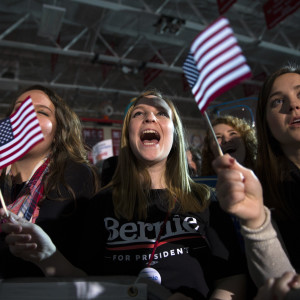Elections have always exposed differences about how young and old vote and the issues they care about. But this election season feels different. In the United States and around the world, a deeper divide and strong pessimism about the future seem to be driving the current discussion. This deserves our attention, and our concern.
Survey results of the American public show that the older you get, the more pessimistic your view about the future of the United States. Millennials generally have a more hopeful view.
According to a recent survey by the Pew Research Center, when asked the question whether life in America is better, about the same, or worse than 50 years ago for people like them, 44 percent of millennials said that life is better for people like them, with 27 percent saying life is worse. But that result is flipped when looking at 50-64 year-olds, 53 percent of which said that life is worse than 50 years ago.
It’s not terribly surprising that younger generations are generally more hopeful — after all, it’s easier to be optimistic when you haven’t yet had to deal with all of life’s complexities. It’s not just older Americans who view life as worse now than 50 years ago for people like them. Large percentages of whites and those who identify as Republican also have a more negative view.
Why is this so troubling? It exposes a rift that is causing deep anger and frustration at the government in the public debate. Unfortunately our political candidates are reacting to this pessimism with more negativity and a lack of hopeful, solution-oriented ideas.
Last year the Pew Research Center also asked Americans whether the United States owed its success to “its ability to change” or “its reliance on long-standing principles.” A majority of millennials and Gen Xers thought that we owed the country’s success to its ability to change, while baby boomers were more divided, with nearly 50 percent saying it was due to its reliance on principles.
We’re seeing a generational difference in the long-term view of this country and its future. Older generations are pessimistic and more uncomfortable with the changing face of America. Younger generations are more hopeful and view change as a more normal part of life.
I myself am a Gen Xer — defined as that generation born between the mid-1960s and the early 1980s. And as someone in the middle of the millennials and the baby boomers, I can understand both sides of this. On the one hand, there are troubling issues plaguing us today — terror attacks around the world, a shrinking middle class here in the United States, and families stuck at the bottom of the economic ladder. But I am longing for a hopeful, solution-oriented discussion about public policy issues that currently seems to be missing.
There’s a delicate balance in proposing policy solutions at a time when trust in the government is low. A large segment of the public feels that government isn’t serving them well, and its track record recently has not helped improve that view. Government still does have core functions, and our lawmakers should be focusing on kitchen table issues, especially those that speak to the middle class and to growing minority populations. They include:
—How to ensure accessible, affordable education and training options to be able to move up the economic ladder;
—How to provide benefits to the poor when they are most needed but ensure they don’t get trapped in a cycle of poverty;
—How to ensure a fair and modern immigration system that benefits our economy;
—How to grow small businesses while freeing up burdensome regulations.
These ideas represent the compassionate and hopeful way to address our electorate.
Millennials are known for being idealistic, hopeful, and compassionate. I’m heartened that as this generation grows older, their influence on the public debate and on public policy will only grow. After all, our future will only look brighter because of them.

